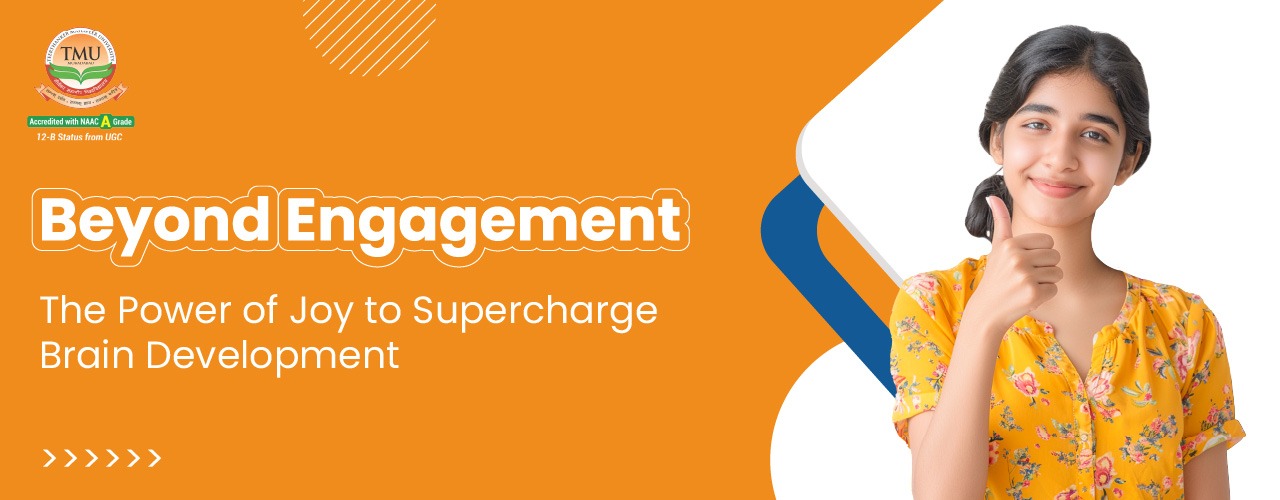Beyond Engagement: The Power of Joy to Supercharge Brain Development
Table of Contents
Nowadays, education is not just about strict rules and long study hours, but about finding joy in learning, making it enjoyable, and turning every lesson into an opportunity for growth. It helps students learn with enthusiasm and makes them ready for a brighter future. A positive, practical, and joyful learning style is emerging as a way to produce better students worldwide.
Education is more than the transmission of knowledge; it is an all-round process that entails cognitive, social, and emotional growth. However, the traditional education and learning process is usually described as meticulous learning, long study hours, seriousness, and strict rules, which are also necessary. But the learning process has made a significant change now.
Modern education systems are now based on the holistic approach. The concept of fun-based learning has taken a step forward. It helps students to be able to progress with their studies and develop personally, and produce an overall positive view of learning and a desire to continue learning after their education.
Understanding Joy in Learning
As the competition is too high now, higher education can be viewed with tension from a student’s point of view. The positive emotions and joy can influence the engagement of students and help them to smarten up, feel happier and become more confident each day.
The context of joy in learning is simply to help students grow personally and create a positive aggregate impression of the learning experience so that they can continue to learn more after completing a course of study. The key features of joyful learning or Joy in learning, are as follows:
- Interactive Methods: Joy in learning includes many interactive sessions, such as incorporating games, music, and hands-on activities to make learning engaging and fun. It also includes group activities and physical & outdoor learning.
- Curiosity & Creativity: Encourage students to explore and create new ideas and express themselves in front of everyone. It helps them to get a deep understanding and develop problem-solving skills and a lifelong love for learning.
- Social and Collaborative Learning: Social and collaborative learning includes group activities, discussion, peer interaction, and skills development. This type of Joy in learning helps students to explore new concepts and build confidence.
- Playful Activities and Games: Joy in learning also includes creative, playful activities such as imaginary role-playing, activities with touch and water, artistic activities like drawing and crafting, and physical activities like obstacle courses.
- Develop Necessary Skills: Joy in learning brings happiness in students, which makes them acquire the key aspects of real life, like confidence, the ability to think critically and communicate. These competencies are quite essential in lifelong personality development.
Teerthanker Mahaveer University
Apply for Admission
Click Here To Apply for Admission
Why is Joy Essential for Education?
The significance of joy in learning in education is that it aids students to enhance their memory, problem-solving, and develop creativity and critical thinking. Happy mood contributes to the reduction of stress levels and also a secure environment where errors are viewed as an experience to learn. Here are a few reasons why Joy in learning is necessary:
- Enhance Motivation: Joyful learning fosters excitement, which increases student’s motivation. A positive learning experience increases the dopamine level, which enhances memory, creativity and problem-solving abilities. It generates a positive cycle in which happiness creates the desire to engage.
- Boost Academic Performance: A positive mind can concentrate on learning and thinking. A happy student approaches learning positively and leading to improved concentration. Positive emotions enhance academic achievement through the improvement of neurological conditions to learn joyfully.
- Foster Creativity: Creativity is encouraged by a joyful learning environment (sense of safety and support ) so that students can express themselves and explore new ideas freely. With students enjoying the learning process, they will be more willing to learn new concepts, develop confidence and share their own point of view.
- Building Lifelong Learners: A joyful learning builds lifelong learners so that they can continue learning after their course of study. To create a happy lifelong learning process, teachers and parents ought to focus on fun learning, develop a growth mindset, and relate learning to world issues and personal experiences.
- Promote Cognitive Skills: Through a positive learning environment, students can promote their cognitive skills, such as attention, memory, retention, problem-solving skills, critical thinking, and work performance. It promotes the deeper involvement, personal drive and better comprehension of ideas by making the learning an enjoyable and curiosity-based process.
Key Facts & Statistics
Improve Learning Outcomes: Joy in Learning improves the outcomes. According to the UNY Journal, the 4th graders participated in a “joyful learning strategy using game method “, and showed an improvement in reading comprehension score. The percentage of students able to reach a passing grade improved from 73.86% in the first cycle to ~87.56% in the second cycle.
Boost Retention and Engagement: Joyful Learning also boosts retention and engagement. Teachers should always support students and try to keep them engaged. According to SAGE Journals 2024, support from teachers increases 28% of student engagement. Swedish students between 9-12 years old said that they experience joy when they understand, when learning matters to them, and when teachers are helpful.
Creativity and Critical thinking: According to AMRS Journals, 2024, joyful learning increased student activity by 14% and learning outcomes by 18% in Indonesia. Joyful learning environments, cheerful and lively, promote curiosity and taking risks. This opens up creativity and advancement of a greater order of thinking.
Strategies to Foster Joy in Learning
Here’s a short breakdown of some strategies which one can embrace to achieve the best learning practices without compromising on the quality of learning:
Creative and Engaging Learning Approaches
So, here is a brief overview of some of the strategies that one can adopt to attain the best practices in learning without necessarily affecting the quality of learning:
- Use Physical Activity Methods: by using methods of physical activity, one can jump, run and stretch, dance, applaud and many more. Physical activity techniques increase happy learning as they improve brain activity, decrease stress and improve mood. Addition of activities such as movement breaks, kinesthetic learning stations, as well as games, can help to improve concentration, memory and problem-solving skills.
- Focus on Practical Learning: A practical approach makes learning more enjoyable by transforming passive learning into active learning. It promotes happy student experiences by creating a more positive and less stressful learning environment. Practical education brings more joy in learning.
- Incorporate Playful Activities: The use of play and games is a crucial part of happy learning or Joy in learning. It enhances student involvement, elevates curiosity and eliminates stress and anxiety as it provides a safe environment. These activities make students experience a low pressure to experiment and make mistakes, and gain confidence.
- Provide Social Connection: Providing social connection makes learning more interesting. Social connections provide supportive and community-based settings where students feel important, appreciated, and understood. It also helps them to acquire emotional intelligence and learn as a genuine, engaging, and fun experience.
- Connect to the Real World: By connecting to the real world, students can enjoy the learning process as it becomes meaningful, relevant and engaging. Real-life situations can assist the students in conceiving and shaping the life skills they need. It gives them a chance to see how they can virtually use their knowledge to the community.
Supportive and Growth Focused Strategies
- Embrace the Passion: Embracing passion promotes happy learning. Students who pursue their passions enjoy their learning. A joyful learning always embraces passion. It improves memory retention, resilience, and creativity.
- Create a supportive Environment: One of the ways through which students learn positively is by creating a positive and supportive environment. It also places emotional security and psychological well-being as a priority, which helps the aspirants in managing the anxieties and stress related to education.
- Personalised Learning: Customised learning fosters the happy learning process through motivation and building confidence. You can make learning a fun and fruitful experience by just taking your time and learning at your own pace.
- Keep Students Challenged: When students feel bored, they are not engaged in learning. So always keep challenges in learning, it gives students a feeling of achievement when they overcome these obstacles. But make sure, it must not be too difficult or too simple: it is discouraging in case it becomes difficult, and too easy in case it becomes dull. Challenges make the learning process more engaging and memorable.
- Encourage Exploration: Encouraging exploration makes learning more enjoyable by fostering curiosity and creativity. Students interact in the form of hands-on experiences and run projects, which breeds confidence and critical thinking as well as a lifetime love of learning. This interactive, fun way of learning (Joy in learning) is more effective at making the students remember the information better.
TMU – Where Curiosity Meets Creativity
Teerthakar Mahaveer University promotes joyful learning. The university offers a facilitating, interactive as well and practical way of learning. TMU places emphasis on the development of students in a holistic way where they are motivated to explore, experiment and improve their creativity and critical thinking skills. Following are some of the most vital highlights of happy learning at TMU:
Academic Philosophy
- Practical Learning: TMU offers both theoretical and practical learning options for students. Here, students get hands-on experience and real projects to work on. TMU also provide internship experiments.
- Holistic Development: TMU is aimed at the development of students. Other than the course, the university also offers specialised skills, e.g. problem-solving skills and critical thinking and works on personality development.
- Industry Exposure: The academic strategy involves giving the students substantial industry exposure in terms of internships, workshops, and career guidance. This gives them the confidence required in the professional world.
- Experienced Faculty: TMU has world-class faculty which gives practical advice and equip students with a profound understanding of subjects. The faculty of TMU gives students both theoretical and technical skills.
Campus Life:
- Vibrant Culture and Modern Infrastructure: TMU possesses state-of-the-art infrastructure consisting of smart classrooms, a library, well-equipped laboratories, student hostels, sports facilities, TMU hospital, food court and internet (Wi-Fi). TMU has an active campus life with various student-centred academics and cultural life.
- Green Campus: The university maintains an eco-friendly and picturesque campus to motivate students and induce a sense of well-being. TMU has taken the initiative of sustainability with a green campus that has solar energy to power, a water treatment plant to recycle, large tree planting and gardens.
- Sports and Recreation: TMU encourages Joy in learning through offering a wide range of indoor and outdoor sports amenities to the students, such as a professional cricket ground and gymnasium, to balance the student life. Sports and games help the university to encourage Joy in learning.
- Safe Environment: Safety is a top priority at TMU, which includes a 24/7 surveillance system on campus. The anti-ragging policies of TMU, ID recognition, and trained security personnel help to maintain the security and well-being of students at TMU.
Student Support
- Placement Support: The university provides students with 100% placement assistance. TMU has a placement support system, CRC, which gives support to its students, like skill development, resume building, and mock interviews.
- Robust Career Services: The university provides excellent career services to students, comprising training, internships and ultimate placement. TMU is proud of over 400 recruiters and high placements.
- Industry Partnerships: TMU provides students with a broad range of opportunities as it has a network of domestic and international collaborators, such as IBM, TCS, Wipro, and NVIDIA.
Conclusion
Joy in learning is an essential factor for quality learning. It develops the learning process positively among students. It enhances memory and understanding through increased innovation and problem-solving. Happy about studying is not just a facilitating aspect of school- it is one of the pillars to the generation of motivated, innovative and self-assured students. When the process of learning is joyful, education is not merely an obligation, but it is a meaningful and fulfilling process.
FAQ
Q1. What are the joys of learning?
Ans. The joy of learning comes from making discoveries, ideas and philosophies, creating the desire, and a passion.
Q2. Why is joy important in learning?
Ans. Joy in learning is very important because it boosts confidence and creativity and reduces stress and negativity. Joyful students are more motivated and engaged in learning.
Q3. What is meant by joyful learning?
Ans. Joy in learning means creating a positive and motivating environment for students so that learning becomes more enjoyable.
Q4. What is the quote about joy in learning?
Ans. A notable quote on the Joy of learning is by Simone Weil, stating, "The joy of learning is as indispensable in study as breathing is to running".
This content gives an overview of the programme and is for educational purposes only. For updated admission guidelines and counselling support, please connect with our Counsellor Team.














